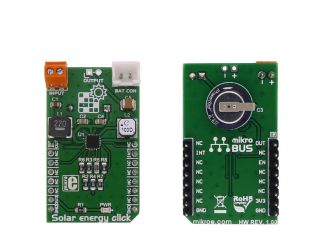
We strongly encourage users to use Package manager for sharing their code on Libstock website, because it boosts your efficiency and leaves the end user with no room for error. [more info]

Rating:
Author: MIKROE
Last Updated: 2019-03-13
Package Version: 1.0.0.1
mikroSDK Library: 1.0.0.0
Category: Battery Charger
Downloaded: 5609 times
Not followed.
License: MIT license
There are many battery chargers and solar energy harvesters out there already, but the Solar energy click has the unique feature - it encompasses both of these devices in a single package.
Do you want to subscribe in order to receive notifications regarding "Solar Energy click" changes.
Do you want to unsubscribe in order to stop receiving notifications regarding "Solar Energy click" changes.
Do you want to report abuse regarding "Solar Energy click".

Library Description
The library covers all the necessary functions to control the Solar Energy Click board. Library performs the communication with the device via GPIO AN, INT, and CS pins. The library has charge enable/disable function and battery good indicator functions.
Key functions:
Examples description
The application is composed of three sections:
void applicationTask()
{
if ( solarenergy_checkIndicator() )
{
solarenergy_chargeDisable();
Delay_ms ( 10000 );
}
else
{
solarenergy_chargeEnable();
}
}
Other mikroE Libraries used in the example:
GPIOUARTAdditional notes and informations
Depending on the development board you are using, you may need USB UART click, USB UART 2 click or RS232 click to connect to your PC, for development systems with no UART to USB interface available on the board. The terminal available in all MikroElektronika compilers, or any other terminal application of your choice, can be used to read the message